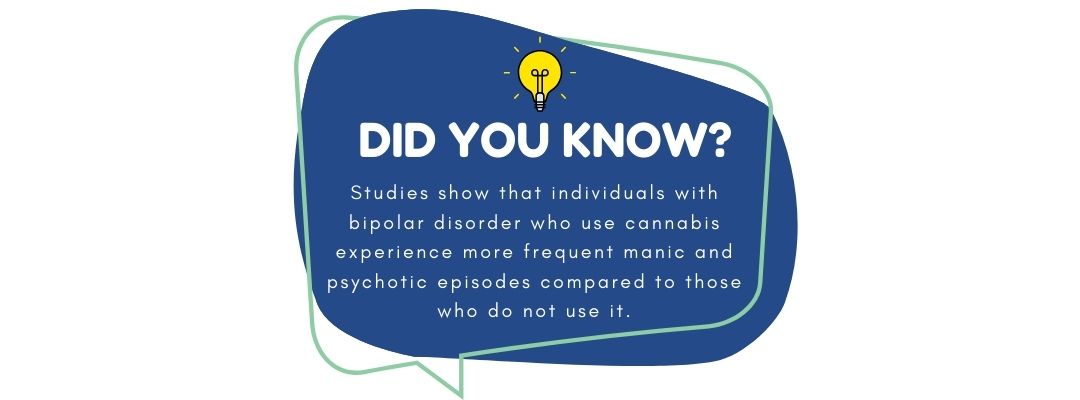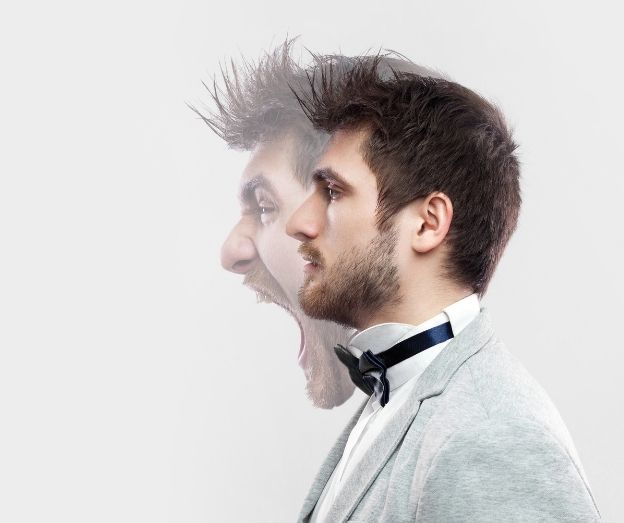Marijuana and Bipolar: Understanding the Effects on Mood Stability
Many people with bipolar disorder use marijuana to help manage their symptoms. Some claim it helps with anxiety, depression, and sleep problems linked to bipolar disorder.
Research shows that marijuana can trigger manic episodes and make bipolar symptoms worse in some people. The mix of marijuana and bipolar disorder creates risks that need careful thought.
Mental health experts suggest people with bipolar disorder avoid marijuana use. The drug can change how bipolar medications work and lead to more mood swings. Anyone thinking about using marijuana for bipolar symptoms should talk to their doctor first.
Understanding Bipolar Disorder
Bipolar disorder causes extreme shifts in mood, energy levels, and behavior that impact daily life. Mental health professionals use specific criteria to diagnose and classify different types of bipolar disorder, which affects millions of people across age groups and demographics.
Diagnosis Criteria
A bipolar disorder diagnosis requires one or more manic or hypomanic episodes. These episodes involve increased energy, reduced need for sleep, and risky behavior.
During manic phases, people might talk faster, start multiple projects, or make impulsive decisions about money or relationships.
Depression episodes often follow mania, bringing low energy, hopelessness, and loss of interest in activities. These episodes typically last at least two weeks.
Medical professionals look for patterns of these mood changes over time. They also rule out other conditions like thyroid problems or drug use that can cause similar symptoms.
Types of Bipolar Disorder
Bipolar I Disorder involves manic episodes lasting 7 days or requiring hospital care. Depression episodes usually occur but aren’t required for diagnosis.
Bipolar II Disorder features hypomanic episodes (less severe than full mania) and major depression episodes.
Cyclothymic Disorder includes milder mood swings lasting at least 2 years in adults or 1 year in children.
Rapid cycling bipolar affects 10-20% of people with the condition, causing 4 or more episodes yearly.
Prevalence and Demographics
About 2.8% of U.S. adults have bipolar disorder. The condition affects men and women equally.
Symptoms usually start in the late teens or early 20s. The average age of onset is 25 years old.
People of all races and ethnic backgrounds can develop bipolar disorder. Family history increases risk – if one parent has bipolar disorder, a child has a 15-30% chance of developing it.
75% of people with bipolar disorder have at least one close relative with depression or bipolar disorder.

Marijuana Overview
Marijuana contains numerous chemical compounds that affect brain function and behavior. Over 100 countries have laws about marijuana use, with some allowing medical or recreational use while others maintain strict bans.
Chemical Composition
Cannabis plants produce over 400 chemical compounds. The main active ingredient is delta-9-tetrahydrocannabinol (THC), which creates most of marijuana’s mind-altering effects.
Cannabidiol (CBD) is another key compound that does not cause a “high” but may have therapeutic benefits.
The potency of marijuana varies widely based on growing conditions and strain type. Modern strains often contain 15-30% THC, much higher than the 3-4% common in the 1970s.
Effects on the Brain
THC binds to cannabinoid receptors throughout the brain. These receptors influence memory, coordination, pleasure, and time perception.
Short-term effects include altered senses, mood changes, and impaired body movement. Memory and learning abilities may decrease temporarily.
Brain development can be affected when teenagers use marijuana regularly. Studies show potential impacts on attention, memory, and learning that may last into adulthood.
Legal and Medical Status
Medical marijuana is legal in 38 U.S. states as of 2025. Doctors prescribe it for conditions like chronic pain, nausea, and muscle spasms.
21 states allow recreational use for adults over 21. Federal law still classifies marijuana as illegal.
Many countries have changed their marijuana laws recently. Canada legalized it nationwide in 2018. Mexico and several European nations permit medical use.
Research continues on marijuana’s medical benefits and risks. Scientists study its potential to treat epilepsy, PTSD, and other conditions.
Marijuana and Bipolar Disorder Interactions
Marijuana affects brain chemistry in ways that can significantly impact bipolar disorder symptoms. Research shows both positive and negative effects that vary between individuals and depend on factors like dosage, frequency of use, and strain type.
Impact on Bipolar Symptoms
THC can trigger manic episodes in some people with bipolar disorder. Users may experience heightened mood swings and increased anxiety during marijuana use.
The drug’s effects on sleep patterns can disrupt the natural sleep-wake cycle, which often makes mood symptoms worse.
Some users report increased paranoia and racing thoughts when combining marijuana with their bipolar condition. These effects can last several hours to days after use.
Risks of Marijuana Use
Regular marijuana use can interfere with bipolar medications, making them less effective at managing symptoms. This interaction may lead to more frequent mood episodes.
People with bipolar disorder face a higher risk of developing cannabis use disorder compared to the general population.
Common risks include:
- Increased frequency of manic episodes
- Worse depression symptoms
- Memory and concentration problems
- Higher rates of psychotic symptoms
Potential Therapeutic Effects
Some bipolar patients report marijuana helps reduce anxiety and promotes better sleep during certain phases of their condition.
CBD, a non-psychoactive component of marijuana, shows promise in reducing anxiety without triggering mania. Research in this area remains limited but ongoing.
Reported benefits:
- Decreased anxiety levels
- Improved sleep quality
- Reduced physical tension
- Better appetite regulation
Medical supervision is essential when considering marijuana use for bipolar symptoms.
Current Research: Marijuana and Bipolar
Scientists have made significant progress in understanding the effects of marijuana use on bipolar disorder through detailed studies and brain imaging technology. Recent research reveals complex interactions between cannabis and mood stability.
Clinical Studies
Research from 2023 at Johns Hopkins University tracked 450 bipolar patients who used marijuana. The study found that 65% reported short-term mood improvements, while 40% experienced more frequent manic episodes over time.
A 2024 clinical trial of 200 participants examined the impact of different THC concentrations. Higher THC levels (above 15%) increased the risk of psychotic symptoms by 28%.
Recent studies show CBD may help reduce anxiety symptoms in some bipolar patients. A controlled trial of 180 people found that 25mg daily CBD reduced anxiety scores by 35%.
Longitudinal Analyses
A 5-year study of 800 bipolar patients revealed that regular marijuana users had 2.5 times more hospitalizations than non-users.
The data showed that patients who quit using marijuana had a 40% decrease in manic episodes within the first year.
Research teams in Canada tracked 600 young adults with bipolar disorder from 2020-2024. Those who used marijuana weekly showed less response to mood stabilizing medications.
Neuroimaging Findings
Brain scans of 300 bipolar patients who use marijuana revealed reduced activity in emotion-regulating areas compared to non-users.
MRI studies in 2024 showed that regular cannabis use altered connections between the amygdala and prefrontal cortex – key areas for mood control.
New PET scan research identifies changes in dopamine receptor activity among bipolar marijuana users. These changes might explain the increased risk of psychotic symptoms.
Treatment and Management Strategies
Managing bipolar disorder while using marijuana requires careful medical supervision and a combination of proven therapeutic approaches. People with this dual diagnosis need personalized treatment plans that address both conditions.
Medicinal Treatment Options
Mood stabilizers like lithium and anticonvulsants form the foundation of bipolar treatment. These medications help control manic and depressive episodes.
Doctors often prescribe antipsychotic medications to manage acute symptoms and prevent future episodes. Common options include quetiapine and olanzapine.
Medical professionals must carefully monitor drug interactions between prescribed medications and marijuana use. Some interactions can increase side effects or reduce medication effectiveness.
Common Medication Options:
- Lithium
- Valproate
- Lamotrigine
- Atypical antipsychotics
- Anti-anxiety medications
Psychotherapy Approaches
Cognitive Behavioral Therapy (CBT) helps patients identify triggers and develop coping strategies for both bipolar symptoms and marijuana use.
Group therapy provides peer support and allows individuals to learn from others facing similar challenges.
Family therapy educates loved ones about dual diagnosis and creates stronger support systems.
Key Therapy Components:
- Mood tracking
- Trigger identification
- Stress management
- Relapse prevention planning
- Communication skills
Lifestyle and Alternative Therapies
Regular exercise reduces stress and improves mood stability. A consistent 30-minute daily workout routine can make a significant difference.
Sleep hygiene practices help maintain stable moods. Setting regular sleep and wake times prevents episode triggers.
Mindfulness meditation reduces anxiety and helps people manage cravings for marijuana.
Stress reduction techniques:
- Deep breathing exercises
- Progressive muscle relaxation
- Yoga
- Regular outdoor activities
- Consistent sleep schedule
A balanced diet supports medication effectiveness and mood regulation. Foods rich in omega-3 fatty acids and B vitamins play important roles in brain health.
Frequently Asked Questions: Marijuana and Bipolar
Many people with bipolar disorder have questions about marijuana use and its effects on their mental health. Medical research shows both benefits and risks when combining cannabis with bipolar disorder.
Can cannabis consumption exacerbate the symptoms of bipolar disorder?
Cannabis can trigger or worsen manic episodes in some people with bipolar disorder. During these episodes, people may experience increased anxiety, racing thoughts, and difficulty sleeping.
The THC in marijuana can intensify mood swings and make symptoms harder to control. Some users report feeling more paranoid or experiencing heightened sensory sensitivity.
What are the possible risks of using cannabis for individuals with bipolar disorder?
Regular cannabis use may increase the frequency of mood episodes. People with bipolar disorder who use marijuana face a higher risk of psychotic symptoms.
Cannabis can affect memory and cognitive function, which may interfere with work and daily activities. Some users experience decreased motivation and energy levels.
How might cannabis interact with medications prescribed for bipolar disorder?
Cannabis can reduce the effectiveness of certain mood stabilizers and antipsychotic medications. The combination may lead to unwanted side effects like dizziness or confusion.
People taking lithium or valproate should be especially careful, as marijuana may affect how these medications work in the body.
Are there any known benefits of using cannabis for bipolar disorder?
Some people report that cannabis helps reduce anxiety and improve sleep during depressive episodes. Certain strains may help calm racing thoughts and reduce stress.
CBD, a component of cannabis, shows promise in managing anxiety symptoms without causing psychoactive effects.
What is the impact of marijuana on mood stability for those with bipolar disorder?
Regular marijuana use can make it harder to maintain stable moods. Some people experience more frequent shifts between depression and mania.
The effects vary greatly between individuals. Factors like dosage, strain type, and frequency of use play important roles.
Is there a link between cannabis use and the onset of bipolar episodes?
Research suggests that heavy cannabis use may trigger manic episodes in some people. Young adults who use marijuana frequently show an increased risk of developing bipolar symptoms.
Early onset of marijuana use, especially during teenage years, is linked to more severe bipolar symptoms later in life.
You’re not alone, and help is always within reach. Contact us today at (774) 619-7750 and take control over your mental health.




